As well as music, St Cecilia (St Caecilia) has also influenced poetry and, to show another example of how St Cecilia has influenced the arts, samples are either included on this page or can be accessed from this page.
Geoffrey Chaucer commemorates her in his Second Nun’s Tale (a poem wholly devoted to her) from ‘The Canterbury Tales’, (Group G of the set of The Canterbury Tales, written between 1385 and 1390). The full text to both the prologue to the Second Nun’s Tale and also the Second Nun’s Tale itself can be accessed by clicking here, which will directly access the Prologue and The Second Nun’s Tale.
There are a number of other poetic works which are mentioned for the sake of showing their existence.
Firstly there is the poem (“Moschus Moschiferus”, by Australian poet A. D. Hope (1907–2000), is subtitled “A Song for St Cecilia’s Day”. The poem is of 12 stanzas and was written in the 1960s.
Cecilia is a symbol for the divine power of music in Heinrich von Kleist’s extended anecdote “St. Cecilia, or the Power of Music”.
Saint Cecilia also features in the 1979 collection of short stories by Angela Carter “The Bloody Chamber” in the story of the same name.
Below there are examples of seven different poets and by clicking on their names you will see an example from each of them where they have paid tribute to St Cecilia (St Caecilia). These examples cover the period from the 17th century up until the present day.
POETRY OF JOHN DRYDEN
The following early poetic example by John Dryden is included below. To hear an example of Georg Frideric Händel’s ‘Ode for St Cecilia’s Day’,using this work as its lyrics, please click here to access.
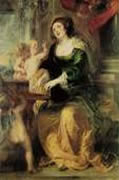 Portrait of St Cecilia by Rubens
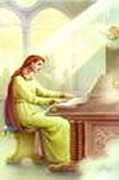 St Cecilia Prayers
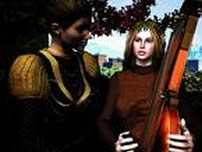 Childhood of St Cecilia
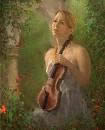 Inspiration of St Cecilia
 Ecstasy of St Cecilia
 Icon of St Cecilia |
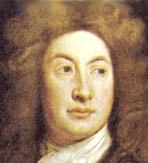 Portrait of John Dryden |
Arthur Quiller-Couch, ed. 1919. The Oxford Book of English Verse: 1250 - 1900. |
John Dryden (1631 - 1700) |
399. A Song for St. Cecilia’s Day, 1687 |
| |
| FROM harmony, from heavenly harmony, | | | Sharp violins proclaim | |
| This universal frame began: | | | Their jealous pangs and desperation, | |
| When nature underneath a heap | | | Fury, frantic indignation, | |
| Of jarring atoms lay, | | | Depth of pains, and height of passion, | 40 |
| And could not heave her head, | 5 | | For the fair, disdainful dame. | |
| The tuneful voice was heard from high, | | | | |
| ‘Arise, ye more than dead!’ | | | But O, what art can teach, | |
| Then cold, and hot, and moist, and dry, | | | What human voice can reach, | |
| In order to their stations leap, | | | The sacred organ’s praise? | |
| And Music’s power obey. | 10 | | Notes inspiring holy love, | 45 |
| From harmony, from heavenly harmony, | | | Notes that wing their heavenly ways | |
| This universal frame began: | | | To mend the choirs above. | |
| From harmony to harmony | | | | |
| Through all the compass of the notes it ran, | | | Orpheus could lead the savage race; | |
| The diapason closing full in Man. | 15 | | And trees unrooted left their place, | |
| | | | Sequacious of the lyre; | 50 |
| What passion cannot Music raise and quell? | | | But bright Cecilia rais’d the wonder higher: | |
| When Jubal struck the chorded shell, | | | When to her organ vocal breath was given, | |
| His listening brethren stood around, | | | An angel heard, and straight appear’d | |
| And, wondering, on their faces fell | | | Mistaking Earth for Heaven. | |
| To worship that celestial sound: | 20 | | | |
| Less than a God they thought there could not dwell | | | GRAND CHORUS. | |
| Within the hollow of that shell, | | | | |
| That spoke so sweetly, and so well. | | | As from the power of sacred lays | 55 |
| What passion cannot Music raise and quell? | | | The spheres began to move, | |
| | | | And sung the great Creator’s praise | |
| The trumpet’s loud clangour | 25 | | To all the Blest above; | |
| Excites us to arms, | | | So when the last and dreadful hour | |
| With shrill notes of anger, | | | This crumbling pageant shall devour, | 60 |
| And mortal alarms. | | | The trumpet shall be heard on high, | |
| The double double double beat | | | The dead shall live, the living die, | |
| Of the thundering drum | 30 | | And Music shall untune the sky! | |
| Cries Hark! the foes come; | | | | |
| Charge, charge, ’tis too late to retreat! | | | | |
| | | | | |
| The soft complaining flute, | | | | |
| In dying notes, discovers | | | | |
| The woes of hopeless lovers, | 35 | | | |
| Whose dirge is whisper’d by the warbling lute. | | | | |
| |
| |
POETRY OF NICHOLAS BRADY
The following example by Nicholas Brady is included below.
 Portrait of St Cecilia by Rubens
 St Cecilia Prayers
 Childhood of St Cecilia
 Inspiration of St Cecilia
 Ecstasy of St Cecilia
 Icon of St Cecilia |
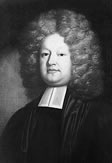 Portrait of Nicholas Brady |
Nicholas Brady (1659 - 1726) |
Hail! Bright Cecilia |
Below are the lyrics to ‘Ode for St Cecilia’s Day’ by Henry Purcell written by Nicholas Brady based on John Dryden’s ‘A Song for St. Cecilia’s’ also included in this section as the first of these samples. To hear an example of Henry Purcell’s ‘Ode for St Cecilia’s Day’ please click here to access. The verse numbering in this poem is based on the music which has section numbers related to it. Number 1 is missing because it is an orchestral overture with no lyrics. |
2. Hail! Bright Cecilia, Hail! fill ev’ry Heart
With Love of thee and thy Celestial Art;
That thine and Musick’s Sacred Love
May make the British Forest prove
As Famous as Dodona's Vocal Grove.
3. Hark! hark! each Tree its silence breaks,
The Box and Fir to talk begin!
This in the sprightly Violin
That in the Flute distinctly speaks!
’Twas Sympathy their list’ning Brethren drew,
When to the Thracian Lyre with leafy Wings they flew.
4. ’Tis Natures's Voice; thro’ all the moving Wood
Of Creatures understood:
The Universal Tongue to none
Of all her num’rous Race unknown!
From her it learnt the mighty Art
To court the Ear or strike the Heart:
At once the Passions to express and move;
We hear, and straight we grieve or hate, rejoice or love:
In unseen Chains it does the Fancy bind;
At once it charms the Sense and captivates the Mind
5. Soul of the World! Inspir’d by thee,
The jarring Seeds of Matter did agree,
Thou didst the scatter’d Atoms bind,
Which, by thy Laws of true proportion join’d,
Made up of various Parts one perfect Harmony.
6. Thou tun’st this World below, the Spheres above,
Who in the Heavenly Round to their own Music move.
7. With that sublime Celestial Lay
Can any Earthly Sounds compare?
If any Earthly Music dare,
The noble Organ may.
From Heav’n its wondrous Notes were giv’n,
(Cecilia oft convers’d with Heaven,)
Some Angel of the Sacred Choire
Did with his Breath the Pipes inspire;
And of their Notes above the just Resemblance gave,
Brisk without Lightness, without Dulness Grave. | |
| |
8. Wondrous Machine!
To thee the Warbling Lute,
Though us’d to Conquest, must be forc’d to yield:
With thee unable to dispute.
9. The Airy Violin
And lofty Viol quit the Field;
In vain they tune their speaking Strings
To court the cruel Fair, or praise Victorious Kings.
Whilst all thy consecrated Lays
Are to more noble Uses bent;
And every grateful Note to Heav’n repays
The Melody it lent.
10. In vain the Am’rous Flute and soft Guitarr,
Jointly labour to inspire
Wanton Heat and loose Desire;
Whilst thy chaste Airs do gentle move
Seraphic Flames and Heav’nly Love.
11. The Fife and all the Harmony of War,
In vain attempt the Passions to alarm,
Which thy commanding Sounds compose and charm.
12. Let these amongst themselves contest,
Which can discharge its single Duty best.
Thou summ'st their diff’ring Graces up in One,
And art a Consort of them All within thy Self alone.
13. Hail! Bright Cecilia, Hail to thee!
Great Patroness of Us and Harmony!
Who, whilst among the Choir above
Thou dost thy former Skill improve,
With Rapture of Delight dost see
Thy Favourite Art
Make up a Part
Of infinite Felicity.
Hail! Bright Cecilia, Hail to thee!
Great Patroness of Us and Harmony! |
| |
| |
POETRY OF JOSEPH ADDISON
The following early poetic example by Joseph Addison is included below.
 Portrait of St Cecilia by Rubens
 St Cecilia Prayers
 Childhood of St Cecilia
 Inspiration of St Cecilia
 Ecstasy of St Cecilia
 Icon of St Cecilia |
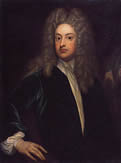 Portrait of Joseph Addison |
Joseph Addison (1672-1719 / England) |
A Song For St. Cecilia’s Day, At Oxford |
I.
Cecilia, whose exalted hymns
With joy and wonder fill the blest,
In choirs of warbling seraphims
Known and distinguish’d fom the rest;
Attend, harmonious saint, and see
Thy vocal sons of harmony;
Attend, harmonious saint, and hear our prayers;
Enliven all our earthly airs,
and, as thou sing’st thy God, teach us to sing of thee:
Tune every string and every tongue,
Be thou the Muse and subject of our song.
II.
Let all Cecilia’s praise proclaim,
Enploy the echo in her name.
Hark how the flutes and trumpets raise,
At bright Cecilia’s name, their lays;
The organ labours in her praise.
Cecilia’s name does all our numbers grace,
From every voice the tuneful accents fly,
In soaring trebles now it rises high,
And now it sinks, and dwells upon the base.
Cecilia’s name through all the notes we sing,
The work of every skilful tongue
The sound of every trembling string,
The sound and triumph of our song.
III.
For ever consecrate the day,
To music and Cecilia;
Music, the greatest good that mortals know,
And all of heaven we have below.
Music can noble hints impart,
Engender fury, kindle love;
With unsuspected eloquence can move,
And manage all the man with secret art.
When Orpheus strikes the trembling lyre
The streams stand still, the stones admire;
The listening savages advance,
The world and lamb around him trip
The bears in aukward measures leap,
And tigers mingle in the dance
The moving woods attended as he played
And Rhodope was left without a shade.
| |
IV.
Music religious heats inspires,
It wakes the soul, and lifts it high,
And wings it with sublime desires,
And fits it to bespeak the Deity.
Th’ Almighty listens to a tuneful tongue,
And seems well-pleas’d and courted with a song.
Soft moving sounds and heavenly airs
Give forece to every word, and recommend our prayers
When time itself shall be no more,
And all things in confusion hurl’d,
Music shall then exert its power,
And sound survive the ruins of the world:
Then saints and angels shall agree
In one eternal jubilee:
All heaven shall echo with their hymns divine,
And God himself with pleasure see
The whole creation in a chorus join.
C H O R U S.
Consecrate the place and day,
To music and Cecilia Let no rough winds approach, nor dare
Invade the hallow’d bounds,
Nor rudely shake the tuneful air,
Nor spoil the fleeting sounds.
Nor mournful sigh nor groan be heard,
But gladness dwell on every tongue;
Whilst all, with voice and strings prepar’d,
Keep u; the loud harmonious song.
And imitate the blest above,
In joy, and harmony, and love.
|
|
POETRY OF ALEXANDER POPE
The following early poetic example by Alexander Pope is included below.
 Portrait of St Cecilia by Rubens
 St Cecilia Prayers
 Childhood of St Cecilia
 Inspiration of St Cecilia
 Ecstasy of St Cecilia
 Icon of St Cecilia |
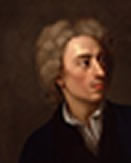 Portrait of Alexander Pope |
Alexander Pope (21 May 1688 – 30 May 1744 / London / England) |
He was called “The Wicked Wasp of Twickenham” for his stinging literary satires of his fellow writers. He modelled himself after the great Classical poets, such as Homer and Virgil, and wrote in a highly polished verse, often in a didactic or satirical vein. The greatest poet genius of his day, he perfected the heroic couplet, which is still in use today. Because of a spinal deformity from childhood, he was only 4 feet 6 inches (approx 135 centimetres) tall. |
Ode on St. Cecilia’s Day |
I.
Descend ye Nine! descend and sing;
The breathing instruments inspire,
Wake into voice each silent string,
And sweep the sounding lyre!
In a sadly-pleasing strain
Let the warbling lute complain:
Let the loud trumpet sound,
’Till the roofs all around
The shrill echo’s rebound:
While in more lengthen’d notes and slow,
The deep, majestic, solemn organs blow.
Hark! the numbers, soft and clear,
Gently steal upon the ear;
Now louder, and yet louder rise,
And fill with spreading sounds the skies;
Exulting in triumph now swell the bold notes,
In broken air, trembling, the wild music floats;
’Till, by degrees, remote and small,
The strains decay,
And melt away,
In a dying, dying fall.
II.
By Music, minds an equal temper know,
Nor swell too high, nor sink too low.
If in the breast tumultuous joys arise,
Music her soft, assuasive voice applies;
Or when the soul is press’d with cares,
Exalts her in enlivening airs.
Warriors she fires with animated sounds;
Pours balm into the bleeding lover’s wounds:
Melancholy lifts her head,
Morpheus rouzes from his bed,
Sloth unfolds her arms and wakes,
List’ning Envy drops her snakes;
Intestine war no more our Passions wage,
And giddy Factions hear away their rage.
| | III.
But when our Country’s cause provokes to Arms,
How martial music ev’ry bosom warms!
So when the first bold vessel dar’d the seas,
High on the stern the Thracian rais’d his strain,
While Argo saw her kindred trees
Descend from Pelion to the main.
Transported demi-gods stood round,
And men grew heroes at the sound,
Enflam’d with glory’s charms:
Each chief his sev’nfold shield display’d,
And half unsheath’d the shining blade:
And seas, and rocks, and skies rebound
To arms, to arms, to arms!
IV.
But when thro’ all th’infernal bounds
Which flaming Phlegeton surrounds,
Love, strong as Death, the Poet led
To the pale nations of the dead,
What sounds were heard,
What scenes appear’d,
O’er all the dreary coasts!
Dreadful gleams,
Dismal screams,
Fires that glow,
Shrieks of woe,
Sullen moans,
Hollow groans,
And cries of tortur’d ghosts!
But hark! he strikes the golden lyre;
And see! the tortur’d ghosts respire,
See, shady forms advance!
Thy stone, O Sysiphus, stands still,
Ixion rests upon his wheel,
And the pale spectres dance!
The Furies sink upon their iron beds,
And snakes uncurl’d hang list’ning round their heads.
| | V.
By the streams that ever flow,
By the fragrant winds that blow
O’er th’ Elysian flow’rs,
By those happy souls who dwell
In yellow meads of Asphodel,
Or Amaranthine bow’rs,
By the hero’s armed shades,
Glitt’ring thro’ the gloomy glades,
By the youths that dy’d for love,
Wand’ring in the myrtle grove,
Restore, restore Eurydice to life;
Oh take the husband, or return the wife!
He sung, and hell consented
To hear the Poet’s pray’r
Stern Proserpine relented,
And gave him back the fair.
Thus song could prevail
O’er death and o’er hell,
A conquest how hard and how glorious?
Tho’ fate had fast bound her
With Styx nine times round her,
Yet music and love were victorious.
VI.
But soon, too soon, the lover turns his eyes:
Again she falls, again she dies, she dies!
How wilt thou now the fatal sisters move?
No crime was thine, if ’tis no crime to love.
Now under hanging mountains,
Beside the falls of fountains,
Or where Hebrus wanders,
Rolling in Maeanders,
All alone,
Unheard, unknown,
He makes his moan;
And calls her ghost,
For ever, ever, ever lost!
| |
Now with Furies surrounded,
Despairing, confounded,
He trembles, he glows,
Amidst Rhodope’s snows:
See, wild as the winds, o’er the desart he flies;
Hark! Haemus resounds with the Bacchanals cries —
— Ah see, he dies!
Yet ev’n in death Eurydice he sung,
Eurydice still trembled on his tongue,
Eurydice the woods,
Eurydice the floods,
Eurydice the rocks, and hollow mountains rung. VII.
Music the fiercest grief can charm,
And fate’s severest rage disarm:
Music can soften pain to ease,
And make despair and madness please:
Our joys below it can improve,
And antedate the bliss above.
This the divine Cecilia found,
And to her Maker’s praise confin’d the sound.
When the full organ joins the tuneful quire,
Th’immortal pow’rs incline their ear;
Borne on the swelling notes our souls aspire,
While solemn airs improve the sacred fire;
And Angels lean from heav’n to hear.
Of Orpheus now no more let Poets tell,
To bright Cecilia greater pow’r is giv’n
His numbers rais’d a shade from hell,
Hers lift the soul to heav’n. |
| |
POETRY OF EDMUND BLUNDEN
The following poetic example by Edmund Blunden is included below.
 Portrait of St Cecilia by Rubens
 St Cecilia Prayers
 Childhood of St Cecilia
 Inspiration of St Cecilia
 Ecstasy of St Cecilia
 Icon of St Cecilia |
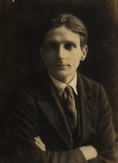 Portrait of Edmund Blunden |
To hear an example of the musical work by Gerald Finzi, ‘For St. Cecilia’s Day’, for which the following poem is the lyrics, please click here to access. |
Edmund Blunden (1896-1974) |
For St. Cecilia
(Ceremonial Ode) |
|
Delightful Goddess, in whose fashionings
And fables Truth still goes adorned;
Resourceful Legend, taught by whom Time sings
Of what had else been lost or scorned,
Thine be our first devotion, while we throng
On this returning day to reverence one,
Thy fairest, and herself Time’s sweetest song:
Sing out Cecilia’s name, and earth is new-begun.
Changed is the age; mysterious, man’s next star;
But Legend’s children share his calendar,
And are beloved though change on change appear,
The due companions of the fleeting year:
St. Valentine for love’s adventure beams,
St. George is with us in war’s iron gleams,
St. Dunstan whose red tongs clipt Satan’s powers,
St. Swithin with his forty days of showers,
And many another saint, are fondly ours;
But where in all the saintly company
Is one beloved beyond melodious Cecily?
How came you, lady of fierce martyrdom,
How came you by your manifold skill?
You found the soul of music yet half dumb,
Deep-chained the utterance that should fill
The high-carved roofs of life with tides of tone.
Then in a rapture conscious of all these
You threw the palace open; and the throne
Blazed forth dominion of infinities.
Straight, by this beautiful inventress given
Art’s clue, a studios angel alit from heaven;
And in good time a host of mortals too
As Cecily’s disciples saw the clue,
| |
|
Till through the West re-echoing genuis vied
In making music where her clear notes guide;
In England too men marked Cecilia’s grace,
There looks turned listening to that faultless face.
Stand with us, Merbecke, and be Byrd close by;
Dowland and Purcell, lift the theme on high;
Handel is here, the friend and generous guest,
With morning airs for her, and choral zest.
How smilingly the saint among her friends
Sits, and with fingers white and long
Awakes her own praeludium, which transcends
The union of all other song!
For ever those the firsi in arts remain,
And their original blooms on winterless;
For ever Cecily’s delights sustain
Song’s later-comers, and her bIue eyes bless.
Wherefore we bid you to the full content
Of St Cecelia’s joyous argument,
And in her host we congregate each form
Her Music takes when it would lull or storm;
And every means that grew beneath her hand
To wing man’s thought far past the ground he spanned.
Exult in music’s strife and music’s calm,
For all man’s martyrdom the crowing psalm,
The gift of St. Cecilia whose young voice
Man doomed to death, and yet who could rejoice,
Sure of her dream that bears the world along,
Blest in the life of universal song.
| | | |
| |
POETRY OF WYSTAN HUGH AUDEN
The following more recent poetic example by Wystan Hugh Auden is included below.
 Portrait of St Cecilia by Rubens
 St Cecilia Prayers
 Childhood of St Cecilia
 Inspiration of St Cecilia
 Ecstasy of St Cecilia
 Icon of St Cecilia |
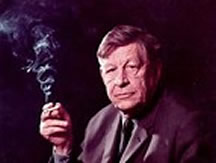 Portrait of Wystan Hugh Auden |
To hear an example of the musical work by Benjamin Britten, ‘Hymn to St. Cecilia’, for which the following poem is the lyrics, please click here to access. |
W.H. Auden (1907-1973) |
Hymn to St. Cecilia |
I.
In a garden shady this holy lady
With reverent cadence and subtle psalm,
Like a black swan as death came on
Poured forth her song in perfect calm:
And by ocean’s margin this innocent virgin
Constructed an organ to enlarge her prayer,
And notes tremendous from her great engine
Thundered out on the Roman air.
Blonde Aphrodite rose up excited,
Moved to delight by the melody,
White as an orchid she rode quite naked
In an oyster shell on top of the sea;
At sounds so entrancing the angels dancing
Came out of their trance into time again,
And around the wicked in Hell’s abysses
The huge flame flickered and eased their pain.
Blessed Cecilia, appear in visions
To all musicians, appear and inspire:
Translated Daughter, come down and startle
Composing mortals with immortal fire.
II.
I cannot grow;
I have no shadow
To run away from,
I only play.
I cannot err;
There is no creature
Whom I belong to,
Whom I could wrong.
I am defeat
When it knows it
Can now do nothing
By suffering.
All you lived through,
Dancing because you
No longer need it
For any deed.
I shall never be Different. Love me.
Blessed Cecilia, appear in visions
To all musicians, appear and inspire:
Translated Daughter, come down and startle
Composing mortals with immortal fire.
| |
|
III.
O ear whose creatures cannot wish to fall,
O calm of spaces unafraid of weight,
Where Sorrow is herself, forgetting all
The gaucheness of her adolescent state,
Where Hope within the altogether strange
From every outworn image is released,
And Dread born whole and normal like a beast
Into a world of truths that never change:
Restore our fallen day; O re-arrange.
O dear white children casual as birds,
Playing among the ruined languages,
So small beside their large confusing words,
So gay against the greater silences
Of dreadful things you did: O hang the head,
Impetuous child with the tremendous brain,
O weep, child, weep, O weep away the stain,
Lost innocence who wished your lover dead,
Weep for the lives your wishes never led.
O cry created as the bow of sin Is drawn across our trembling violin.
O weep, child, weep, O weep away the stain.
O law drummed out by hearts against the still
Long winter of our intellectual will.
That what has been may never be again.
O flute that throbs with the thanksgiving breath
Of convalescents on the shores of death.
O bless the freedom that you never chose.
O trumpets that unguarded children blow
About the fortress of their inner foe.
O wear your tribulation like a rose.
Blessed Cecilia, appear in visions
To all musicians, appear and inspire:
Translated Daughter, come down and startle
Composing mortals with immortal fire. | | | |
| |
POETRY OF JENNIFER HARRISON
The following very recent poem as a tribute to St Caecilia by Australian poet, Jennifer Harrison is included below.
 Portrait of St Cecilia by Rubens
 St Cecilia Prayers
 Childhood of St Cecilia
 Inspiration of St Cecilia
|
 Ecstasy of St Cecilia
 Icon of St Cecilia |
|
 Portrait of Jennifer Harrison |
From book: Michelangelo’s prisoners (written 1990s) |
Jennifer Harrison (Australian poet born 1955) |
St. Cecilia |
| | ’’’this holy lady
with reverend cadence and subtle psalm,
like a black swan as death came on...
W.H. Auden
You left, I awoke in a strange city.
A woman stood by the roadside
her face swabbed by headlights
her nylon umbrella no shelter from the rain’s
oblique flood.
The road was a black ribbon to sleep on
and sleeping there
beneath a pestle of wet stars
hammered flat by the speeding cars
she felt her heart, stripped spare
become less brittle.
Rising in the morning quite fresh
from this sleep, she walked for a while
but could not find the school and
sat not caring by a weathered coastline.
Clouds clung to the water-spill.
And she braided her hair
into a thick rope thrown back
across one shoulder and she began to build a house
with lizards and tibias and, without praise
named, one by one
the black swans gliding through mist.
| | |
|













